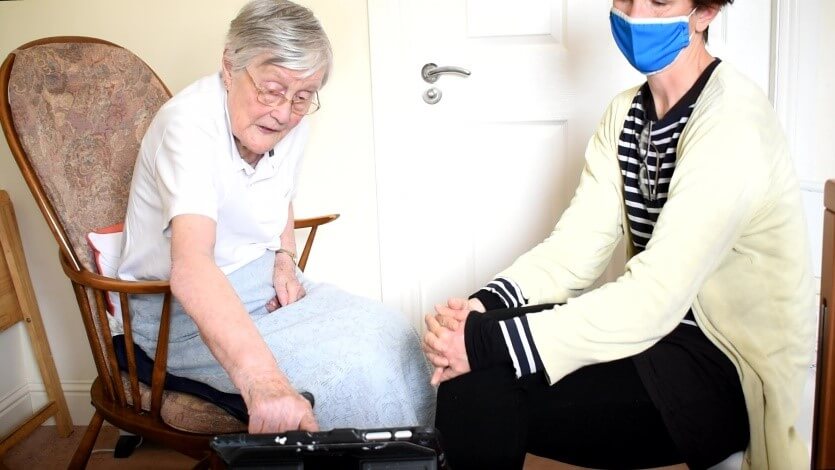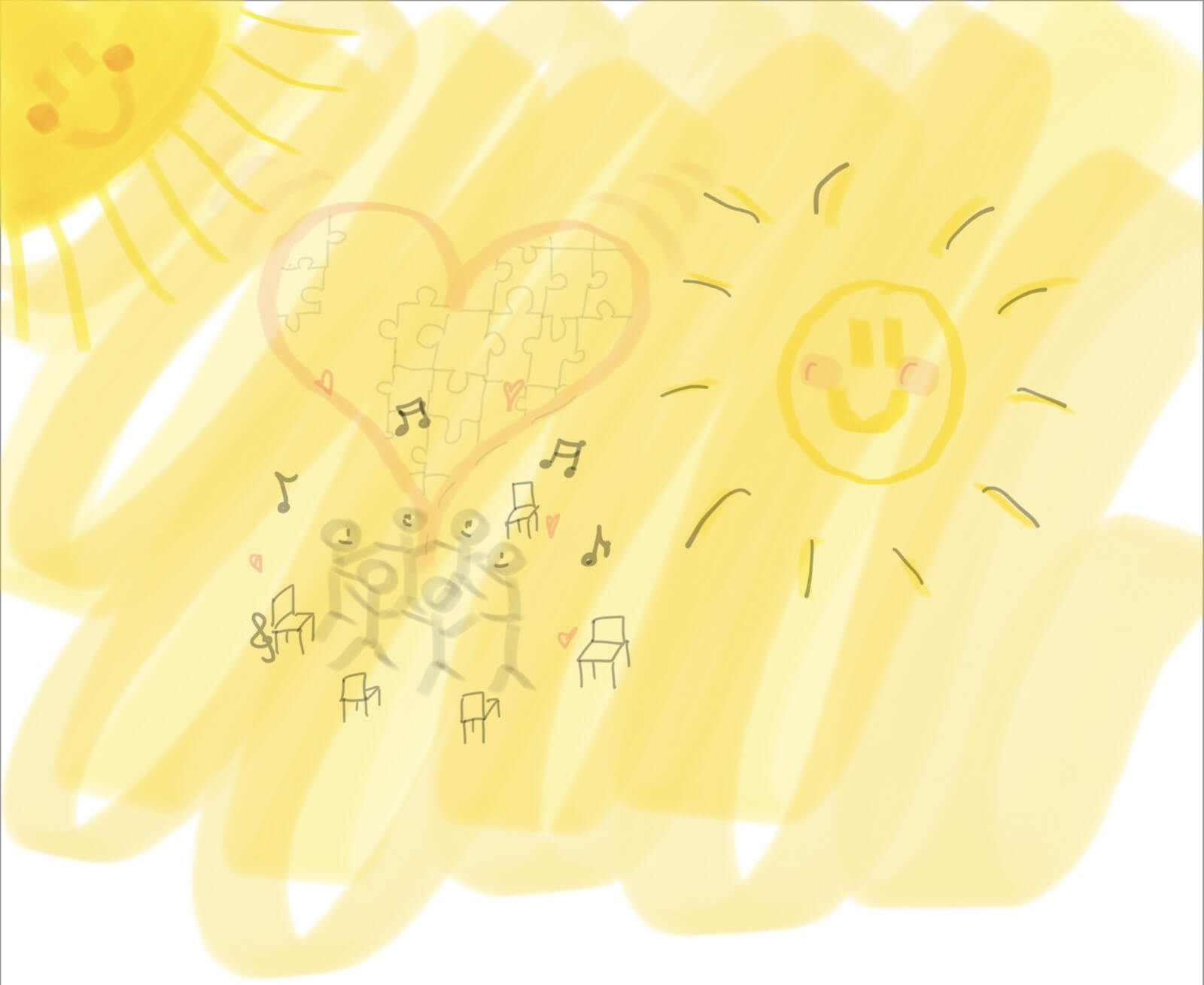A conversation between Evangelia Saridou & Elaine Kordys
Evangelia and Elaine mid blether
Meeting Elaine
My name is Evangelia Saridou and I am a currently in my 4th year of a Psychology & Counselling degree at Abertay University. My course includes a work placement module so I have worked alongside Elaine Kordys founder of Spin Turn Creative Movement. As part of this I interviewed Elaine to learn more about her work and her recently completed resource ‘Tools for Reflection in Creativity’, a bold Scotland mini commission.
To understand the background of the resource, Elaine introduced her work and herself.
Dance has been a dominant presence in her life ever since she was small. She ballroom danced, disco danced and generally enjoyed moving around (so her parents told her!). She describes how “movement and art have always given me the possibility to connect, to relate and to express myself when words were sometimes troublesome.”
Elaine aged 8 doing a ‘living room show’
Elaine has studied a joint honour in Dance and Visual Art (Brighton-1998), Dance and Movement Therapy (Bristol-2000) and most recently the Post Graduate Diploma in Dementia Studies (Stirling-2020).
As part of her Dance and Movement Therapy training she completed a work placement at a Gerontology Ward in a psychiatric hospital. Through these dance interventions Elaine saw the possibility to encourage self-expression, connection and improved physical and mental health. She has continued to develop her creative movement work alongside people with a dementia diagnosis over the years and focuses predominantly on the expressive potential in movement. During the pandemic she set up her small business Spin Turn Creative Movement in Helensburgh.
Light Gatherers
In the pandemic Elaine made the screen dance film Light Gatherers commissioned through Dance Base Scotland. You can view Light Gatherer’s here! The Commission invited artists to find creative approaches to work with the communities they had lost touch with during the pandemic. To Elaine, these communities were some of the care organisations she was no longer able to visit. Elaine worked alongside the Argyle Care Centre and with two of their residents Mary and Jill, both of whom have a dementia diagnosis. Elaine explains: “Light Gatherers weaves creative conversations and movement explorations between myself, Mary and Jill who both live in a local care home where I had previously delivered movement sessions. Light Gatherers was a route into connection and joy in a time of isolation and disconnect.”
Jill & Elaine in a movement session making Light Gatherers
Following the making of Light Gatherers, Elaine realised that “there wasn’t really the opportunity for any meaningful reflection with Mary and Jill about the work.” She pondered how to “allow for more meaningful inclusion from the people you are working alongside.” To address this, she applied for a bold mini commission to support the development of this research. Elaine had completed the bold programme in 2020 and felt the bold ethos of flourishing, inclusivity and creativity would be the perfect foundations for allowing this kind of research to grow. ‘bold Mini Commissions aim to create content that contributes to a Flourishing Space, enabling the values of the bold project and partners to come alive and contribute to building a bold community.’
A bold mini commission
Elaine commenced the research by doing a lot of reading and researching. She googled and explored what was out there concerning evaluation, creativity and working alongside people with a dementia diagnosis. There wasn’t a lot. Elaine then reached out to a range of people, including therapists, artists, and researchers who worked in the field and subsequently pulled in different aspects she believed to be relevant to the research. Over time Elaine gathered several creative methods that could be used as evaluation tools.
Elaine then invited Mary and Jill from the Light Gatherers film to work alongside her as co-researchers to explore the tools. This research took place on a one-to-one basis, face to face at their care home as, by this time, some visiting restrictions had been lifted. Therefore, Mary and Jill were her first face to face sessions out of zoom since COVID. Elaine described this experience as “just delightful.” What she valued most was “this intimacy of the time with them, it meant we were able to explore the tools in a really focused and experimental way”. Together they worked through about ten or twelve different methods, some they came up with together, some Elaine had proposed and researched previously.
Mary as co-researcher experimenting with ‘expressive visual art making
After this period of creative research with Jill and Mary, Elaine completed writing the Reflective Guide with support of the bold team and bold partner and dementia activist James McKillop. According to Elaine, James’ feedback was immensely valuable “because he read it as him, a highly creative person who has a dementia diagnosis. He responded with honesty on how it would be useful to him and how it wouldn’t be”. The overall process of making the Guide has been collaborative with approximately 15 people contributing at different points.

Jill with Elaine exploring ‘photo prompts’
Elaine invited me to use one reflective tool to reflect on my attendance to one of her online Vibrant Communities sessions with the care homes. I chose the ‘expressive visual art making tool’ which promotes self-expression and reflection on a chosen emotion. I tried to visualise the feeling of happiness with colour pencils. Usually, participants would sit together and draw on a big sheet of paper in the middle of the group. I chose to do it on a tablet. Throughout the process, I felt light and smiley while drawing just like throughout the movement session. It helped me to reflect on the session and the opportunity to do this deepened my understanding of it.

Evangelia’s outcome of exploring with the tool ‘expressive visual art making’
Elaine hopes the Reflective Guide can support those working alongside people with a dementia diagnosis and people working creatively whom have a dementia diagnosis to have more tools to encourage co-production, reflection, and evaluation which can enrich their work. The Reflective Guide aims to “give more possibilities for collaboration, communication and inclusion”.
Regardless of the numerous strengths of the Reflective Guide, Elaine disclosed: “All pieces of work should have more questions afterwards.” Thus, “if there was potential to return to [the Reflective Guide], [she] would really like to widen the remit and be able to work alongside people with more of a sensory language and people whose dementia is more advanced.”
Title Page of The Reflective Guide
Since the original interview the Resource has now been distributed and has been picked up with interest by a wide variety of people and organisations. It appears that it is not only of interest in the creative arts and health sector but in others too. Personally I may use it again as a tool for reflection and I look forward to seeing how the Resource may develop in the future.
Written by Evangelia Saridou
Edited by Elaine Kordys
You can download the ‘Tools for Reflection in Creativity’ guide here!





